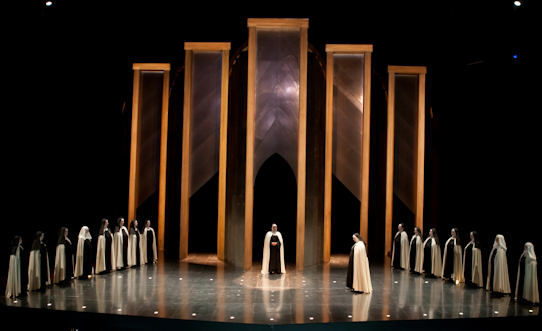Other Links
Editorial Board
-
Editor - Bill Kenny
Founder - Len Mullenger
Google Site Search
SEEN
AND HEARD INTERNATIONAL OPERA REVIEW
Poulenc, Dialogues des Carmelites: Soloists, Orchestre National du Capitole. Choeur du Capitole. Conductor:Patrick Davin. Halle aux Grains de Toulouse. 27.11.2009 (JMI)
Production: Théâtre du Capitole.
Direction: Nicolas Joel (Original).
Stéphane Roche (Revival).
Sets and Costumes: Hubert Monloup.
Lighting: Allain Vincent.
Cast:
Blanche de la Force: Sophie Marin-Degor.
Mère Marie: Susanne Resmark.
Madame de Lidoine: Isabelle Kabatu.
Madame de Croissy: Sylvie Brunet.
Soeur Constance: Anne-Catherine Gillet.
Marquis de la Force: Nicolas Cavallier.
Chevalier de la Force: Gilles Ragon.
L’Aumônier: Leonard Pezzino.
Le Geôlier: Olivier Grand.
Mère Jeanne: Qiu Lin Zhang.
Soeur Mathilde: Catherine Alcoverro.
Un Officier: Daniel Djambazian.
Premier Commissaire: Christophe Mortagne.
Deuxieme Commissaire: Paul Kong.
Thierry: Bruno Vincent.
Monsieur Javelinot: Yves Boudier.

Toulouse’s Halle aux Grains is not exactly an opera venue, but a concert hall which provides a practical alternative when the Capitole is closed for building work. This has happened three times in recent years; the first time was in the 1995-96 season, then in the 2004-05 season and finally again now. The hall is a hexagon with a stage space in the centre and, of course, has very little stage equipment. This means that the productions offered in this space must be necessarily designed on the basis of the constraints of the hall and even the season’s program is largely conditioned by existing productions. This is probably the reason why Poulenc’s Dialogues des Carmelites was here again; it was last performed in Toulouse in 1995, when the opera season had moved away from the Capitole theatre.
The production is a revival of the Nicolas Joel original which was premiered 14 years ago on this same site. It consists of a single set at the back of the stage, showing a building with some gothic arches, while all of the action takes place at the front with only a few props. Both sets and the attractive costumes - from the time of the French Revolution - are by Hubert Monloup. In this opera, where all the action takes place within enclosed spaces, lighting is of great importance and the lighting plot by Allain Vincent is very well done, particularly in the final guillotine scen. This is a good production, well suited to the characteristics of the hall and it is only in the massed scenes that the direction loses interest. It should be noted that this production received an award to the best French lyric production in in 1996. This time Stephane Roche, who is usually Nicolas Joel’s assistant was in charge of it.
For previous performances of this opera in the Halle aux Grains Michel Plasson was in the pit but this time we were not quite so lucky, having the Belgian conductor Patrick Davin in charge. His reading was effective but fell short of being great: in general, I found him better in the first part of the opera, while in the second half he lacked some of the necessary elegance and delicacy. He drew a good performance though from the ever reliable Orchestre National du Capitole.
Blanche de la Force was interpreted by the French soprano Sophie Marin-Degor, whose voice was not ideally suited to the demands of the score and so she came across as as providing something of a routine performance. She has a pleasant but rather small voice with some serious shortcomings at both extremes of its compass.
Mère Marie was the Danish mezzo Susanne Resmark, with a good middle register, while her upper range proved to be somewhat lacking in quality. I assume too that her French pronunciation would not have been to the liking of the audience and suspect that more interesting mezzos for the part are available without leaving France. The Belgian soprano Isabelle Kabatu sang Madame di Lidoine and was also rather disappointing. Her soprano has become dryer in recent years and the high notes have lost their former quality.
I had the good fortune to see Sylvie Brunet sing Madame de Croissy in Seville some six years ago and was pleased to have had a repeat of her excellent interpretation. She was then exciting and moving in Seville and this time she achieved proved to be at the top level as both actress and singer. Far too often, this character is given to an old glory past her prime: Sylvie Brunet proves that the First Prioress needs a good singer with the voice in first-rate condition. Undoubtedly, she was the best in the cast.
Another very good performance came from Anne-Catherine Gillet as Soeur Constance. She was excellent from beginning to end.
From the lesser characters I should mention Le Chevalier de la Force sung by tenor Gilles Ragon, with a considerably more heroic voice than is usual in the character, but providing a very convincing portrayal. Nicolas Cavallier was also a good Marquis de la Force although Leonard Pezzino was no more than acceptable as the chaplain to the convent. The secondary roles were all very convincing.
This was the first performance of the revival and it had an almost full house. At the final bows triumphs were awarded to Sylvie Brunet and Anne-Catherine Gillet while the others were also warmly applauded.
I should like to end by highlighting the tribute that the Capitole pays in the its program to the tenor Christian Jean, recently passed away, who was the Aumônier in this production in 1995, as he was also in Bilbao in 2007.
José M. Irurzun
Picture © Patrice Nin
